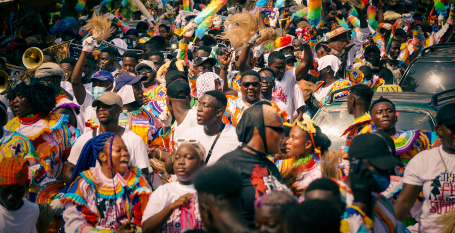US Vice President Kamala Harris has spoken out in support of LGBTQ people in Africa, at a time when Uganda has introduced new laws to persecute the queer community.
The Vice President was speaking at a press conference in Ghana.
Standing alongside Ghana’s president, Nana Akufo-Addo, the Vice President said she felt “very strongly” about supporting the development of LGBTQ rights in Africa.
“I will also say that this is an issue that we consider and I consider to be a human rights issue and that will not change...” added the Vice President. “A great deal of work in my career has been to human rights issues and equality issues across the board including, as it relates, to the LGBTQ+ community. I feel very strongly about supporting freedom and supporting and fighting for the equality of all people.“
Elsewhere in the press session, President Akufo-Addo mentioned that a proposed anti-LGBTQ+ bill was currently making its way through the Ghanaian parliament, but that it “hasn’t been passed”.
“The attorney general has found it necessary to speak to the committee about it regarding the constitutionality or otherwise several of its provisions...” said the President. “At the end of the process, I will come in, but in the meantime, the parliament is dealing with it.”
What’s life like for LGBTQ people in Ghana?
What’s life like for LGBTQ people in Ghana? Let’s take a look at some of the key equality indicators.
Is homosexuality legal in Ghana?
Gay sex has been illegal in Ghana since the 1860s. The penalty is imprisonment for up to three years.
Are there anti-discrimination protections in place for LGBTQ people in Ghana?
There’s no anti-discrimination framework in place to protect LGBTQ people from discrimination based on their sexuality.
Is there Marriage Equality in Ghana?
There’s no legal recognition of same-sex relationships.
What’s life like for LGBTQ people in Ghana?
Most of the anti-LGBTQ rhetoric in Ghana comes from Christian groups who say homosexuality is a sin. There is also a belief that the promotion of homosexuality is part of a Western agenda to spread European and US values in Africa.
LGBTQ people in Ghana face frequent abuse and discrimination, including blackmail, extortion, and violent attacks.
What’s the history of homosexuality in Ghana?
In the 18th and 19th century Asante courts, male slaves served as concubines.
The Nzema people had a tradition of adult men marrying each other, usually with a 10-year age difference. These marriage were called agyale – friendship marriages. The couple would observe all the social equivalents of a heterosexual marriage, a bride price was paid and a traditional wedding ceremony was held.

